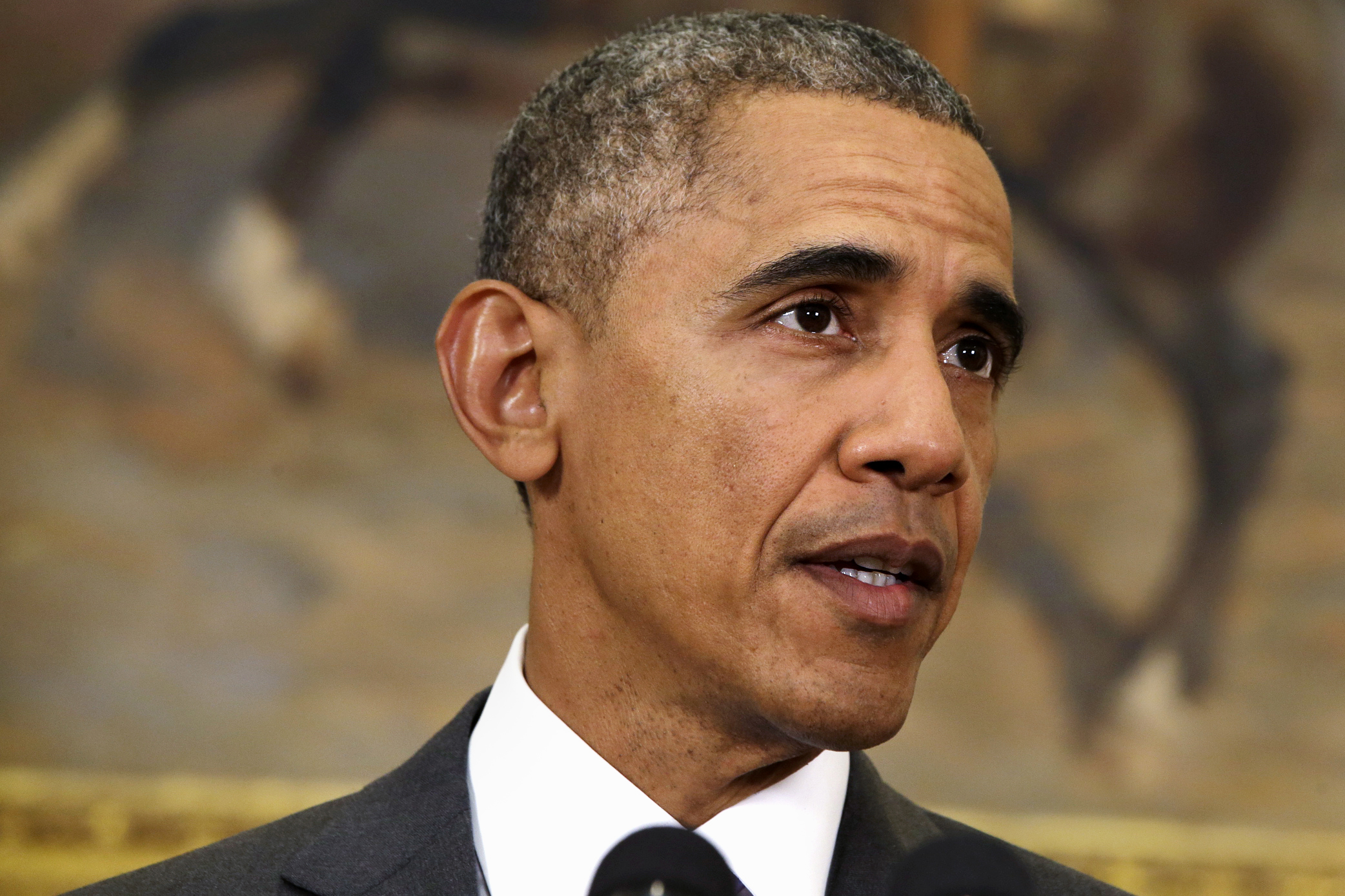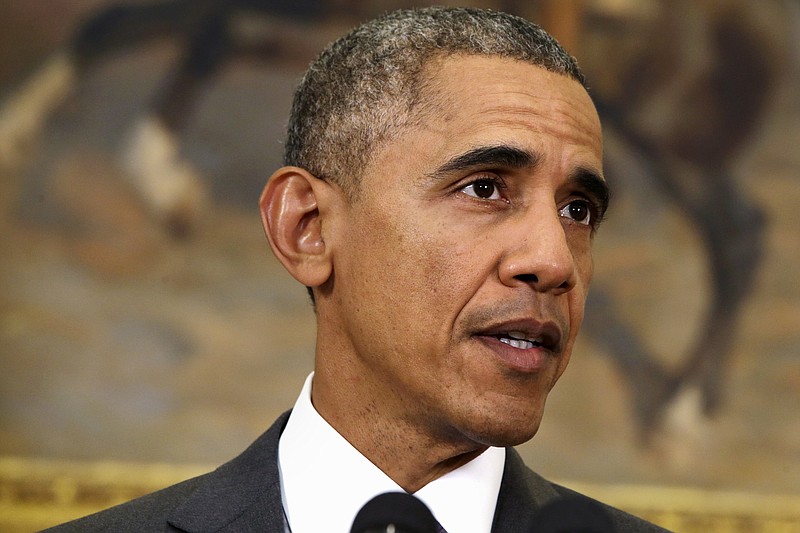 President Barack Obama speaks about the Islamic State group, Wednesday, Feb. 11, 2015, in the Roosevelt Room of the White House in Washington. Obama asked the U.S. Congress on Wednesday to authorize military force to "degrade and defeat" Islamic State forces in the Middle East without sustained, large-scale U.S. ground combat operations, setting lawmakers on a path toward their first war powers vote in 13 years. (AP Photo/Jacquelyn Martin)
President Barack Obama speaks about the Islamic State group, Wednesday, Feb. 11, 2015, in the Roosevelt Room of the White House in Washington. Obama asked the U.S. Congress on Wednesday to authorize military force to "degrade and defeat" Islamic State forces in the Middle East without sustained, large-scale U.S. ground combat operations, setting lawmakers on a path toward their first war powers vote in 13 years. (AP Photo/Jacquelyn Martin) President Obama buried the lead in his request to Congress for war powers Wednesday, but he was nevertheless right for making the request.
The Islamic State, if left unchecked, he said in a letter accompanying his request, "will pose a threat beyond the Middle East, including to the United States homeland."
That is the number one reason, though not the only reason, the United States should care about a terrorist group operating 6,000 miles from Washington, D.C. Indeed, in a sense, the group already has surpassed being a mere threat to the homeland. It has killed at least four American hostages.
Besides that, though, it has murdered or perpetrated other heinous acts on thousands of innocent people in Syria and Iraq and virtually destabilized those two countries.
Obama should have led with his strength in his White House briefing, but he was too focused on the past, opining that "the United States should not get dragged back into another prolonged ground war." He was referring, of course, to the Iraq war begun in 2003 under his predecessor, President George W. Bush.
What the president didn't mention, of course, was that his failure to leave troops in Iraq -- which was requested by Iraqi officials -- is one reason the Islamic State group had little trouble invading the country.
While Obama deserves credit for requesting a specific authorization from Congress for actions he is currently taking under Bush-era 2001 and 2003 congressional sanctions, his ambiguous proposal left more questions than it answered.
He proposed legislation for three years but said it wasn't a timetable. He ruled out a long-term commitment of ground forces but said he wants the flexibility for ground combat operations "in other more limited circumstances." He said "our coalition is on the offense" but said it will take time. He said the legislation would repeal one Bush-era authorization but would leave in place another.
War, unfortunately, does not fit into a tidy box. It kills people and breaks things, and not always in a prescribed area and not within anyone's timetable.
The Islamic State does not operate by the Marquess of Queensberry rules of war. Two aligned sides won't come at each other as the Union and the Confederacy did at Gettysburg. No, the terrorist forces believe they are in a battle sanctioned by God. As such, they will fight in stealth, will put innocent women and children in the way and will attempt to expand their jihad wherever they can.
It would be nice to say the U.S. could employ its array of air power -- and drones -- to wipe out the Islamic State in a month, but it can't. It also will take ground forces, and by rights they should be the ground forces of the countries affected -- Iraq and Syria -- and their interested neighbors. So far, the neighborhood approach hasn't taken care of the problem.
War-weary Americans don't want to see more troops return to the Middle East, so administration officials will have to weigh that against participation in an action-limited but drawn-out conflict.
Thus, Obama, a back-bench Illinois state senator at the beginning of the Bush administration who says in hindsight he would have opposed his predecessor's war-powers request, finds himself having to walk a narrow line in making his own war-powers request.
He has been given advice, including personally from Sen. Bob Corker, R-Tenn., the chairman of the Senate Foreign Relations Committee, to lay before the Republican Congress and the American people his rationale for action against the Islamic State, but his fellow far-left Democrats abhor war, hated Bush and don't want him to give but the most limited hint of further action.
Such an Authorization for Use of Military Force (AUMF) request by Obama requires a vote by Congress, and hearings on the matter are slated to begin after next week's Presidents Day recess, Corker said Thursday. Just having an AUMF, though, "totally changes the dynamic" for discussion by Congress, he said, "and I thank him for that."
What's most critical in the discussion, he said, is the strategy in Syria, "where there isn't anything to build off of." Where there are several "elements" in Iraq battling the Islamic State, the current opposition in now-"festering" Syria is having to ward off both ISIS and President Bashar al-Assad, making the present U.S. strategy one of "containment." That, he said, "is not a winning strategy."
Obama, according to Corker, will have to put "significant commitment toward the effort" of making his case and will have to call on Congress to support it, especially those on the Democratic side of the aisle.
The hearings, he said, will allow everyone concerned to "drill down and understand" what the administration has in mind.
And as they do, in the background, they should remember that nothing less than the homeland Obama referred to is ultimately at stake.
